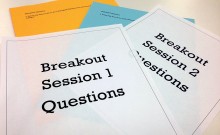Dream big

This describes the beginning of our strategic planning process, launched in January. It’s inspirational, participatory and creative. The goal has been to get as many people as possible involved in thinking about what the future could hold and should hold for Wheaton. Already, more than 300 people have contributed their ideas to the discussion. There’s room and time for more, if you haven’t joined in yet.
The idea behind the discussions taking place on campus, online and in cities across the country is to identify what distinguishes the Wheaton experience and what we do really well. With these strengths as the foundation, the process has encouraged people to dream big: What are our aspirations for the college? What do we want Wheaton to be in five years? What do we want Wheaton to be known for? What are the programs and practices that will make us even more distinctive than the rest of the nation’s liberal arts colleges?
The broad involvement from every corner of the college community is encouraging. Everyone involved has been energized by the breadth of ideas. The passion that people feel for the college comes through in no uncertain terms, and this passion has spurred new and innovative ideas that will shape the college in exciting ways.
Certain themes and observations arise in almost every conversation, no matter the group of people. One consistent theme is the pride in our Connections curriculum, which is unique and worthy of building upon. With that pride has come both the recognition that we must continue to be a leader in curriculum innovation and a renewed commitment to providing one of the best broad-based but connected academic experiences in the world.
A second idea that arises consistently involves further development of the research and internship experiences that have been a hallmark of a Wheaton education for decades. We already have a vast array of opportunities for our students to work with professors on research, and we provide significant support for students who want to engage in internships. We already provide funding for about two-thirds of Wheaton students to pursue an unpaid internship, service project or research with our faculty. The strategic planning conversations have allowed us to dream about what it would mean if the college could offer that opportunity to every student. Not only would it distinguish Wheaton as a leader in this area, it would also truly set our students apart as they pursue their aspirations after Wheaton.
We know that Wheaton’s emphasis on learning in the classroom and beyond already gives our students an edge, and expanding the opportunities for funded research and internships would help us to have an even greater impact. Six months after Commencement we surveyed the Class of 2014 and found that 98 percent of the class had found success in reaching their immediate postgraduate goals. What I think is most impressive is that success for these recent graduates manifested itself in a variety of ways—in landing jobs (63 percent), enrolling in graduate school (22 percent), or participating in national service, internships (9 percent) or fellowships (4 percent). Results like this compare favorably with any institution, and we can create even more opportunity for our graduates with the ideas arising out of the strategic planning process.
Experiential and interdisciplinary learning are great examples of things that Wheaton is known for and does well already. Focusing on them provides us with an opportunity to further distinguish the college by pushing ourselves to be more innovative and to do more. The planning process has also identified our tightknit and cohesive community as a core strength. Now it’s time to think about how we can leverage these, and other distinguishing characteristics, to shape the future of this special place.
We need your voice and your involvement to help build this future. Between now and the start of summer, the Strategic Planning Task Force—comprising alumnae/i, students, faculty and staff—will be seeking your input in various ways. Please join us and share your ideas to help make Wheaton stronger and better.
